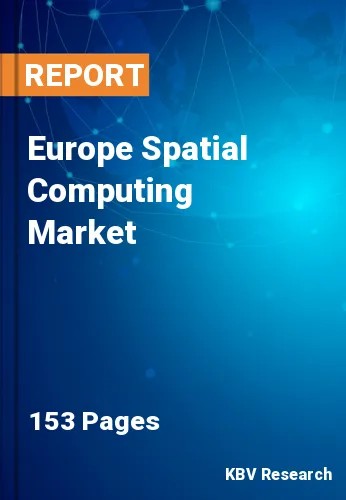The Europe Spatial Computing Market would witness market growth of 20.0% CAGR during the forecast period (2023-2030).
The market has experienced substantial expansion, driven by rising demand for immersive experiences, technological developments, expanding acceptance across industries, hardware and software infrastructure improvements, and investments and funding in technology companies. The market has applications in multiple industries, such as gaming, entertainment, healthcare, education, and retail. Utilizing computing, industries are enhancing consumer experiences, enhancing training and simulation, streamlining design and prototyping, enabling remote collaboration, and releasing new business opportunities.
AI algorithms enable real-time object recognition, scene understanding, and personalized interactions. In contrast, IoT connectivity allows computing devices to interact with the physical environment and other connected devices, creating a seamless and interconnected ecosystem. Early adopters of spatial computing technologies include the gaming and entertainment sectors. This technology has revolutionized gaming by allowing players to interact with virtual objects and immerse themselves in virtual worlds.
Europe has seen a surge in VR gaming, with a growing number of gamers adopting VR headsets for immersive experiences. European game developers have created VR titles that appeal to various players, from casual gamers to enthusiasts. Augmented reality gaming, including location-based AR games, has gained popularity in Europe. Games like Pokémon GO and Harry Potter: Wizards Unite have attracted a dedicated player base across the region. Augmented reality gaming, including location-based AR games, has gained popularity in Europe. Games like Pokémon GO and Harry Potter: Wizards Unite have attracted a dedicated player base across the region. As spatial computing technologies continue to mature and demonstrate their value in these sectors, their adoption is expected to grow, further contributing to expanding the market in Europe.
The Germany market dominated the Europe Spatial Computing Market by Country in 2022, and would continue to be a dominant market till 2030; thereby, achieving a market value of $27,184.6 million by 2030. The UK market is exhibiting a CAGR of 19% during (2023 - 2030). Additionally, The France market would experience a CAGR of 20.9% during (2023 - 2030).
Based on End User, the market is segmented into Healthcare, Aerospace & Defense, Automotive, Energy & Utilities, Gaming, Consumer Electronics, Architecture, Engineering, and Construction (AEC), Government and Public Sector, Information Technology, Education, and Others. Based on Solution, the market is segmented into Hardware, Software, and Services. Based on Technology, the market is segmented into Augmented Reality, Virtual Reality, Mixed Reality, Artificial Intelligence. Internet of Things (IoT), Digital Twins, and Others. Based on countries, the market is segmented into Germany, UK, France, Russia, Spain, Italy, and Rest of Europe.
Free Valuable Insights: The Global Spatial Computing Market will Hit $423.5 Billion by 2030, at a CAGR of 20.3%
The market research report covers the analysis of key stakeholders of the market. Key companies profiled in the report include Apple Inc., Avegant Corporation, Blippar Group Limited, Seiko Epson Corporation, Google LLC, HTC Corporation, Lenovo Group Limited, Magic Leap, Inc., Microsoft Corporation, NVIDIA Corporation.
By End User
By Solution
By Technology
By Country
Our team of dedicated experts can provide you with attractive expansion opportunities for your business.

